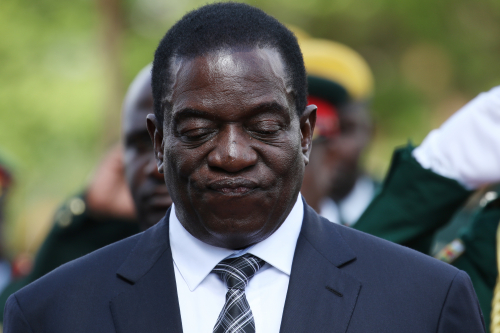
By Alfonce Mbizwo/Admire Jamu-Mlambo
ZIMBABWE’S political leaders have become too selfish by enriching themselves while burdening the country’s suffering masses through suffocating taxes and beatings for protesting the oppression, the Catholic Church has said.
This is the second time in two months that the church has called the country’s political leaders to order over the deteriorating political and economic crises, the worst in over a decade and wants an all-inclusive dialogue to address the malaise.
Since President Emmerson Mnangagwa took over from long-time ruler, the late former President Robert Mugabe in November 2017 after a coup, hopes that the economy would quickly rebound have faded fast, with Zimbabweans grappling with rolling power cuts of up to 20 hours a day, a crashing economy and soaring prices against stagnant wages.
“As the poor get poorer, the leaders seem to get richer, less caring and demanding more from the citizens, especially the taxpayers, who are themselves growing fewer and fewer as companies close down,” the Zimbabwe Catholic Bishops’ Conference (ZCBC) said in their December pastoral letter yesterday.
“At the centre of our national crises is a leadership crisis. We do not seem to have leaders who think about our challenges as national challenges. Most of our leaders at all levels seem to think of safeguarding their own personal welfare and the welfare of their friends and relatives. More concern is placed on personal financial security, acquisition and keeping of political power and raising their social significance.”
Since 2017, inflation has spiked from under 1% to 440% in October, invoking fears of a return to the hyperinflationary era last seen just over a decade ago under Mugabe, while shortages of fuel and medicines were worsening ahead of the festive holidays, amid an acute foreign currency shortage.
The economy is expected to shrink for the first time by 7,1% in over a decade, according to the International Monetary Fund.
- Chamisa under fire over US$120K donation
- Mavhunga puts DeMbare into Chibuku quarterfinals
- Pension funds bet on Cabora Bassa oilfields
- Councils defy govt fire tender directive
Keep Reading
The new currency introduced in June is on a free-fall, while 7,7 million Zimbabweans are facing hunger and the worst drought since 1992.
Mnangagwa and MDC leader Nelson Chamisa, who lead the country’s biggest political parties, have been spurning calls for dialogue, with the Zanu PF leader demanding recognition as leader of the country before any talks could take place. Chamisa wants an independent arbiter.
“Given the depth of our crisis and how long it has been going on, it appears to be selfish for our leaders to be focusing on who among them is a legitimate leader. It appears to us to be a clear sign of unhealthy egoism for political leaders to be placing selfish conditions on national dialogue and reconciliation,” the ZCBC said.
“Time has come for every citizen to come to the table with humility and focus on the common good. We call for a comprehensive national dialogue. The national dialogue must be all-inclusive, with representatives from government, political parties, civil society, business and the church. A new spirit must emerge to direct national development.”
The ZCBC is made up of Robert C Ndlovu (Archbishop of Harare and ZCBC president), Alex Thomas (Archbishop of Bulawayo and also ZCBC vice-president), Paul Horan (Bishop of Mutare), Michael Bhasera (Bishop of Masvingo and Pontifical Administrator of Gweru), Albert Serrano (Bishop of Hwange), Rudolf Nyandoro (Bishop of Gokwe), and Raymond Mupandasekwa (Bishop of Chinhoyi).
“We can now clearly see that the nation has a deficit in the trust that citizens place in national leadership and national institutions. Citizens have been crying to the leaders to find solutions, but it seems all they get is, at best, a cold shoulder and at worst, loss of jobs, teargas, arrests and beatings for, allegedly, participating in ‘regime change agenda’.”
The bishops, who tried and failed to mediate in the labour dispute between junior doctors and the government, noted that the strike by the health practitioners was a sign of the general deterioration of all the sectors of the society which include education, health, politics and social welfare.
“The nation is facing shortages of energy, water and other basic commodities. Infrastructure like roads, railways, dams and bridges is in terrible disrepair with little hope of the problems being fixed. This process has taken a long time to develop,” the ZCBC said.
The bishops said the “narrow way of thinking pays very little attention to the common good, solidarity and special care for the poor and marginalised.”
“This is what has been termed “the tragedy of the commons”, where there is an unhealthy conflict between the short-term interests of individuals, especially leaders and the long-term interests of the society as a whole.
“Clearly, the focus on short-term interests of leaders as they fight to get and keep political power is taking attention away from the common interests that could protect the weak, marginalised and the impoverished.”











